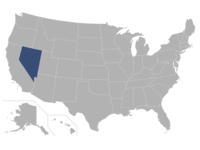$10K reporting threshold for athletes’ NIL deals would mean ‘very little reporting’

How much money should a student athlete be able to make off their “name, image, or likeness” before having to report it?
That was one of the questions that a legislative interim committee created to study NIL deals has decided to pass on to lawmakers when they next meet in regular session early next year.
The interim committee created to study usage of “name, image, likeness (NIL) deals of student athletes met for a final session last week, this time not to hear coaches, athletes and compliance officers from colleges in Nevada but for finalizing a set of recommendations, which will be proposed to state Senate and Assembly Education Committees.
In 2021, Nevada Legislature passed a law prohibiting colleges and sports organizations from preventing student athletes from being compensated for the use of their name, image or likeness. The bill, which went into effect on Jan. 1, 2022, required the creation of an interim study committee, which would make recommendations for the 2023 Legislature to consider.
One of the committee’s recommendations approved last month suggests legislators set a dollar amount on deals that would trigger student athletes and their institutions to report the deals to the Nevada System of Higher Education.
Committee Chair Cameron Miller and Vice Chair Roberta Lange said during the meeting they had earlier discussed that the amount should be $10,000 or above.
UNLV Athletics Director Eric Nepomuceno agreed, saying that most deals are for $25, something that a student athlete would be paid to attend a child’s birthday party. He was concerned that detailed paperwork and disclosure requirements should not be the reason for an athlete to lose deals that are of lesser value.
Ultimately, as suggested by the Committee Chair, Nepomuceno proposed the dollar amount to be $10,000 or whatever the Education Committee decides it to be.
Such a high reporting threshold would likely mean the overwhelming majority of NIL deals in Nevada would not be reported. INFLCR, which manages NIL deals nationally and operates a compliance platform for athletes and colleges, says that as of January 2022 average NIL transactions were just over $2,300.
Another company, Opendorse, which helps athletes build their brand on social media, has average deals of just over $1,100, the New York Times last December..
If the reporting threshold is set too high, “there will not be much information available for such disclosures,” said Ben Chase, an attorney who serves as the national director of strategy and programming for a Las Vegas based NIL collective named Blueprint Sports.
Chase says median Blueprint Sports NIL deals are around $700. Some other NIL deals that exist are also “in kind” products such as laptops and supplements or commission-based deals where a student athlete can make as little $10 or as much as $10,000.
Chase is concerned with disclosure of deals in a state like Nevada where there is a “group think” that student-athletes at universities aren’t as “marketable” or playing on the biggest stages compared to student-athletes from other universities across the country. He called $10,000 “an arbitrary number” that “will likely result in very little reporting.”
Interim Committee Chair Assemblyman Cameron C.H. Miller and Vice Chair Sen. Roberta Lange did not respond to requests for comment.
National guidance and international students
In a letter to Nevada’s congressional delegation, the members of the interim committee also emphasized the need for a nationwide, uniform NIL policy.
The committee stated that a national policy will help address the current inconsistencies between state laws and also detail the role of individual educational institutions in supporting NIL laws.
The committee also suggested that a federal NIL policy should consider the status of international student athletes, specifically to address the limitations that students with an F-1 status confront due to conditions on their visa which restrict them to work outside school.
The interim committee also recommended that the Nevada System of Higher Education (NSHE) study challenges and limitations faced by junior and community colleges in navigating NIL deals, with special attention to students that would need to transfer between junior colleges and Division 1 universities. The committee was unsure how to tackle this recommendation.
Terina Caserto, senior policy analyst of academic and student affairs at NSHE, suggested that the study should be conducted by National Junior College Athletics Association (NJCAA) and not by the Board of Regents.
College of Southern Nevada Athletic Director Dexter Irvin said he was not opposed to sending the recommendation to the NJCAA, but he was unsure that there would be any action on it. “You would get a nice letter back, but we are not going to see anything different,” he added.
Ultimately, the interim committee amended the recommendation to ask that the education committee decide which organization should study issues pertaining to junior colleges.
The recommendations approved last week would also require student athletes to consistently follow institutional and NSHE policies and regulations, which can be local, state, federal, and that of athletic associations.
Some of the recommendations on NIL “best practices” include requiring that student athletes not take part in NIL engagements compromising their academic and athletic pursuits. Also, athletes must have written permission from their institution for usage of logos, marks and facilities for NIL deals.
Students would also be provided educational support to help them navigate financial implications, including taxes and scholarship impacts.
The committee also recommended that state gaming regulators monitor NIL deals for connections with the gaming industry.
Under the interim committee’s recommendations, any entity engaging in an NIL deal must disclose NIL contracts to the student athlete’s school, which would then report the deals to NSHE. Earlier, student athletes were responsible for this disclosure.
Note: This story originally incorrectly described Blueprint Sports median deals, and was revised to clarify Ben Chase’s comment about athletes at Nevada schools being “marketable.”








